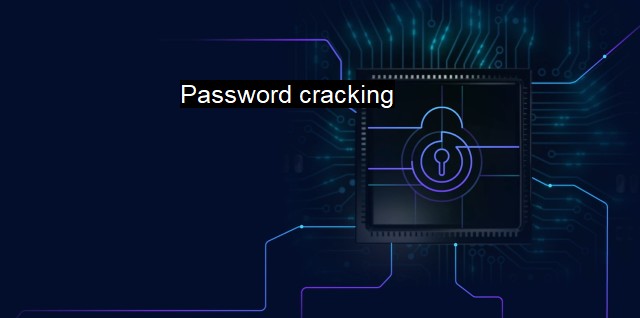What is Password cracking?
The Rising Threat of Password Cracking in Today's Cybersecurity Landscape: Understanding the Methods and Mitigating Vulnerabilities
Password cracking is a prominent aspect of cybersecurity and one of the numerous types of computer security threats that require constant vigilance and strong defenses. password cracking refers to the process of gaining unauthorized access to a system or network by decoding passwords.This practice involves identifying a device's weak spots to search and find the password using varying methods, including brute force, dictionary attacks, and rainbow table attacks, among other technically advanced processes. Cybersecurity experts usually utilize these techniques to detect potential vulnerabilities in a system and perfect their workability. unfortunately, ill-intentioned hackers also employ them to compromise systems or networks and obtain sensitive data to perpetrate their malevolent actions.
A brute force method involves an attacker testing all potential passwords until the right one is located. This technique can be very time-consuming, mainly if a complex password is deployed. Physical accesses to the hardware and high computational resources hasten the speed at which a brute force attack can succeed. To counter this, it’s critical to employ complex, lengthy, and truly random passwords.
A dictionary attack, on the other hand, entails the application of a file with words that operate as trialed passwords. Many users predominantly deploy typical English words or predictable password combinations. Attackers take advantage of this regular tendency to save time and mounting computational processing charges. Hence, customarily utilizing non-typical English words and injecting characters within words improves resistance against dictionary attacks.
Meanwhile, a rainbow table attack involves precalculated hashes on potential passwords that make it easier to check against an existing password. It enables accelerated password discovery because it reduces the time required to compute individual hashes. System administrators can mitigate such attacks through practices, like password salting, which adds unique, random data to each password.
Software tools and programs exist that are designed explicitly to aid attackers in carrying out password cracking. They automate the cracking process, allowing millions of guesses to be processed per second. Cyber security specialists have also designed antivirus software to protect systems from these types of attacks. They recognize unusual activities, offer active protections, and notify users when their system security is compromised.
Users should take certain imperative measures that can safeguard their systems against these types of security threats. This includes avoiding simple passwords—who, when arranged together, form words or phrases from the dictionary. A secure system makes use of intricate combinations of alphanumeric and special characters, ensuring adequate password length and frequently changing the passwords. a two-factor authentication (2FA) system also offers a substantial degree of protection since it requires more than one factor for login, making it harder for the hacker to infiltrate the system.
Cybersecurity threats such as password cracking pose considerable challenges to individual and network system security. While improved security measures and vigilance can counter such attempts to an extent, nothing can replace the benefits of diligent password practices. This means avoiding basic personal information and predictable verbiage or patterns, regularly updating passwords, and investing in reputable antivirus software as an extra precaution. Nurturing this culture of proactive behavior, particularly in an age where digital platforms form the bulwark of both personal and professional interactions, is critical.

Password cracking FAQs
What is password cracking?
Password cracking is the process of guessing or retrieving a password from a computer system, software or network.Why do people use password cracking techniques?
There are multiple reasons as to why people use password cracking techniques, which includes retrieving lost passwords, testing the strength of password security, and in some instances, to commit cyber crimes.How can I protect myself from password cracking attacks?
There are several ways to protect yourself from password cracking attacks including the use of strong passwords, enabling two-factor authentication, and updating your software and antivirus programs regularly.Is it legal to use password cracking tools?
The use of password cracking tools may be illegal if it is done without the consent of the computer's owner or if it is used for nefarious purposes. However, in some cases, it may be legal to use these tools for cybersecurity and ethical hacking purposes with proper certification and authority.| | A | | | B | | | C | | | D | | | E | | | F | | | G | | | H | | | I | | | J | | | K | | | L | | | M | |
| | N | | | O | | | P | | | Q | | | R | | | S | | | T | | | U | | | V | | | W | | | X | | | Y | | | Z | |
| | 1 | | | 2 | | | 3 | | | 4 | | | 7 | | | 8 | | |||||||